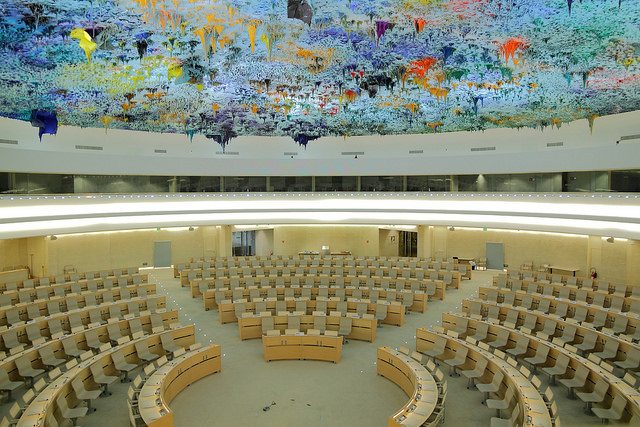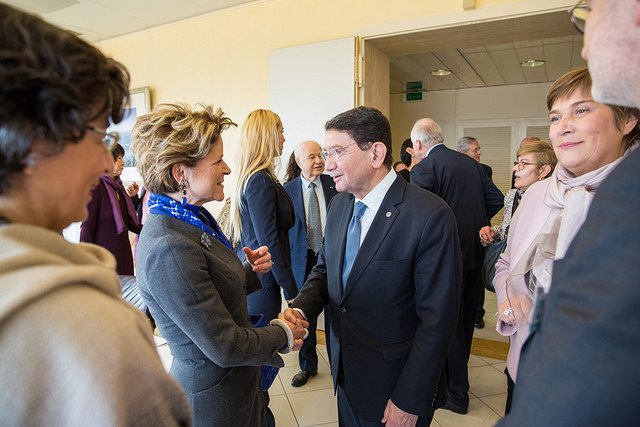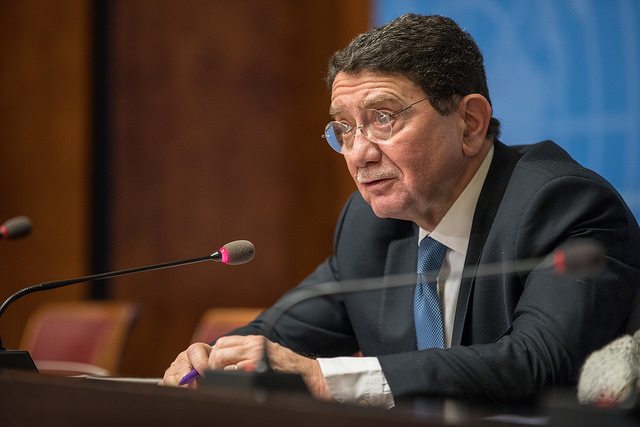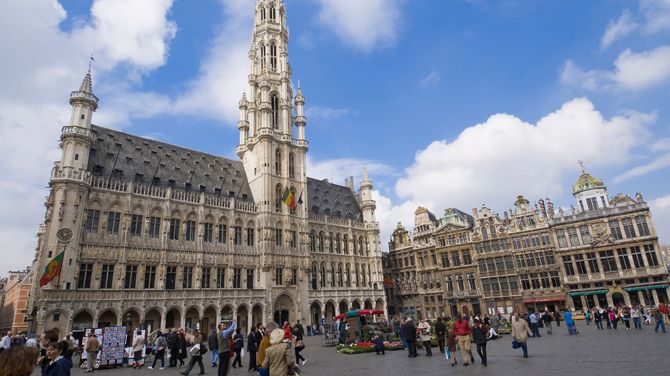

UNWTO sets tourism roadmap towards 2030 at the Palace of Nations in Geneva
Participants from around the world joined the Official Closing ceremony of the International Year of Sustainable Tourism for Development 2017 at the Palace of Nations, in Geneva, Switzerland. The event reviewed the year´s main achievements and discussed the roadmap for advancing the contribution of tourism towards the 2030 Agenda for Sustainable Development.
“2017, the International Year of Sustainable Tourism for Development, has been a unique opportunity for all of us to come together to promote the contribution of tourism to shape a better future for people and planet and to contribute to making this world a better place.“ said UNWTO Secretary General, Taleb Rifai, opening of the event. “We count on you as we embark on this exciting new journey towards 2030. I trust that together, as a sector, as people with the same vision and commitment, we will go far.” he added.
“Sustainability remains the bedrock of our activity. We will continue to drive the conversation on planning for and managing tourism growth, define a sector-wide response to climate change, work on how the sector can reduce illegal trade in wildlife and contribute to inclusive job creation” said Gloria Guevara, President and CEO, World Travel & Tourism Council (WTTC)
“It is so important that we succeed in making tourism sustainable by making sustainable tourism economically viable, culturally accepted, and universally practiced.” said Michael Møller, Director General, United Nations Office at Geneva (UNOG). “The United Nations World Tourism Organization deserves great credit for tackling this head on throughout this past year.” he added.
“I personally believe that the future of tourism lies in enabling ICT capacities. Accordingly, we should harness those powers for smart tourism… I believe that the way forward in our journey to 2030, is smart tourism. I call on all of you to guide me and support me in this endeavor” said Talal Abu-Ghazaleh, Chairman, Talal Abu-Ghazaleh Organization in Jordan.
”In the future, a strong international cooperation of all relevant actors involved in the tourism sector should become the driving force to promote sustainable tourism and to implement tourism policies efficiently” said Marie-Gabrielle Ineichen-Fleisch, State Secretary Economic Affairs (SECO) of Switzerland.
Addressing the event was also HM King Simeon II, Special Ambassador of the IY2017 who stressed the importance of public/private partnerships for sustainable tourism.
The panel discussions counted with the participation of the Ministers of Tourism of Costa Rica, Mauricio Ventura, Jamaica, Edmund Bartlett and Kenya, Najib Balala alongside representatives of IY2017 partners such All Nippon Airways, Amadeus, the Balearic Islands Tourism Agency, ECPAT International, the Institute for Tourism and Leisure, HTW Chur University in Switzerland, Minube, Myclimate, PRMEDIACO and the Ras Al Khaimah Tourism Development Authority in the United Arab Emirates.


As part of the legacy of the IY2017, UNWTO presented the results of the ‘Tourism and SDGs’ Report developed in collaboration with the United Nations Development Programme (UNDP). The report which looks into the links between tourism and the SDGs in national policies as well as private sector strategies shows the relevance for the sector of Goals 1 (No Poverty), 4 (Quality Education), 8 (Decent Work and Economic Growth), 11 (Sustainable Cities and Communities), 12 (Responsible Consumption and Production), 13 (Climate Action), 14 (Life Below Water) and 17 (Partnerships for the Goals).
On the occasion, UNWTO launched the Tourism and the Sustainable Development Goals Programme as a legacy of the International Year of Sustainable Tourism for Development 2017. The Programme aims at advocating for the contribution of sustainable tourism´s to the 17 SDGs and encouraging the full integration of tourism and the SDGs in national, regional and global agendas. It includes the future ‘Tourism and SDGs’ online platform – a co-creation space to inspire and empower the tourism sector to act – developed by UNWTO with the support of SECO and an Ambassadors Initiative.
The Tourism and SDGs Ambassadors designated on the occasion include HE Shaikha Mai bint Mohammed Al Khalifa, President of Bahrain Authority for Culture and Antiquities, the President of Costa Rica, HE Luis Guillermo Solís, Mr. Huayong Ge, President of UnionPay China; Dr Talal Abu Ghazaleh, Chairman of the Talal Abu-Ghazaleh Organization and Dr Michael Frenzel, President of the Federal Association of the German Tourism Industry.

UNWTO and European Commission address the significance of the Tourism Satellite Accounts to measure the economic impact of the sector in Europe
The World Tourism Organization (UNWTO) and the Directorate-General for Internal Market, Industry, Entrepreneurship and SMEs (DG GROW) of the European Commission gathered national tourism policy makers and statisticians in Brussels to advance in the implementation of the measurement of the economic impact through Tourism Satellite Accounts.
As part of the events connected to the 2017 International Year of Sustainable Tourism for Development, and within the framework of the cooperation between UNWTO and DG GROW, the two institutions co-organized the Workshop “Measuring the economic impact of tourism in Europe: the Tourism Satellite Account (TSA)”, in collaboration with Eurostat. The event, hosted by DG GROW, was held in Brussels, Belgium on 29-30 November, 2017.
Bringing together over 100 policy makers (data users) and tourism statisticians and TSA compilers (data producers) from EU Member States and COSME [1] countries, the Workshop helped to bridge better understanding and entice collaboration amongst these key stakeholders.
“The economic importance of tourism in the European Union is increasingly recognized and better understood, partly thanks to the development of TSA in some EU Member States. It is important to create cohesion around this theme and we hope that the EU becomes an example in this regard to guide the rest of the regions,” said UNWTO Secretary-General Taleb Rifai.
A sense of optimism for tourism measurement and TSA in Europe emerged, alongside the realization that TSA is beyond a technical exercise, very much a strategic endeavor for the tourism sector.
The workshop was conducted with expertise from the European Commission (including Eurostat), UNWTO, UN Statistics Division (UNSD), Statistics Austria, the National Statistical Office of the Czech Republic, Destination Canada and Statistics Malaysia.
The topics debated ranged from technical inputs to governance issues and political leadership, all elements necessary for a successful TSA implementation. The participants exchanged ideas on the current status of the different national TSAs, their specificities and how to build the capacities and enabling environments for furthering their development. A key conclusion was that the challenges of TSA development in Europe have less to do with technical expertise and more with resource, communication, and political engagement.
The discussions have also emphasized the need to improve timeliness, while maintaining credibility, and fostering partnerships and dialogue between data producers and users. Reliable aggregated TSA estimates are key for strong tourism policy making which aims to support a sustainable and resilient tourism sector.
TSA is an instrument to measure and monitor the economic impact of tourism and links data on tourism to the broader economy. It is an accounting framework enabling the measurement and international comparison of the contribution of tourism to job creation, economic growth and the generation of wealth.The Conference held under the patronage of H.H. Sayyid Fahd bin Mahmoud al-Said, Deputy Prime Minister for the Council of Ministers of Oman, brought together Ministers of Tourism and Ministers of Culture as well as private sector stakeholders and experts with the objective of building and strengthening partnerships between the tourism and culture sectors and enhance their role in the UN’s 2030 Agenda for Sustainable Development.
